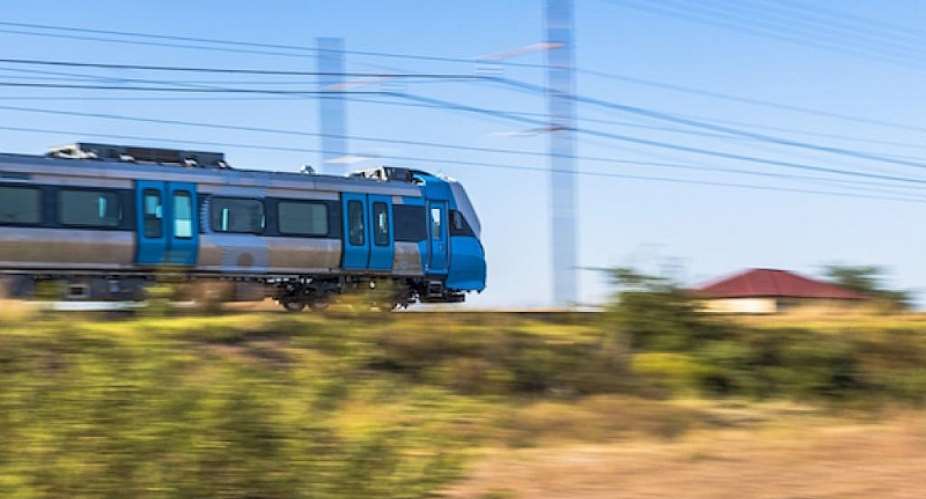As one of South Africa's privileged partners, France has been investing in the country's railway industry in a partnership with local companies. A partnership that is bearing fruit with a successful transfer of skills.
With over 370 French companies operating in South Africa, France is the 4th largest investor in the country, providing 37,000 jobs and generating 8.5 billion euros for the South African economy.
The transport sector is an area where the French-South African collaboration is proving particularly successful, with an ongoing partnership between Alstom, the French-based multinational transport company, and South African railways.
Gibela is the result of this partnership. Founded in 2012, the Gibela Rail Transport Consortium is a joint venture where Alstom holds a 61 per cent stake of the shares while Ubumbano Rail and New Africa Rail own the rest between them.
The Passenger Rail Agency of South Africa (PRASA) was looking for an international partner to revitalise the country's railway industry and the tender went to Alstom, a company that has been operating in South Africa for the past 100 years. Way back in 1925, Alstom built South Africa's first electric locomotive engine for the country's expanding rail network.
Paris-Pretoria partnership
“This partnership is the largest investment that the South African government has put in place for the refurbishment of the railway system in South Africa,” declared Rapulane Molekane, South Africa's ambassador to France.
Gibela has been tasked with delivering 600 metro trains over the next ten years. So far, 22 have been deployed by PRASA of which 18 are operational in one corridor in Pretoria alone - the remaining four have yet to be put into commercial service.
The Gibela factory, described as the first modern train manufacturing plant in South Africa, is located in Dunnottar in Gauteng province. A location chosen by PRASA in a bid to revive a poverty-stricken area.
Gibela's operation represents an almost 6 million euro investment plan into the region, employing 800 workers of which nearly 50 per cent are women, as the company's development strategy strives to meet the South African government's 2030 National Development Plan.
“We have obligations that were defined with PRASA, our customer. These range from local content, skills development and to the broad-based black economic empowerment,” explains Dr Buyiswa Mncono-Liwani, Economic Development Director for Gibela.
She says that the company is committed to work with local suppliers and labour.
“We have about 60 suppliers, local companies across South Africa, which are supplying us with about 71 per cent of train components - from passenger doors to cables,” accoding to Mncono-Liwani.
Developing local skills
Investment in skills development is one of Gibela's main aspirations.
“We are committed to train 19,500 South Africans. And we are on track in terms of achieving that obligation over the next 10 years,” Mncono-Liwani added.
One aspect of this programme consists of giving out bursaries “to upskill students”. Namely from marginalized communities.
“The focus of the students should be on engineering studies and, so far, we have awarded 650 bursaries. We also have artisan training which focuses on youth from disadvantaged communities. Here we have trained 225 learners,” she declared.
Another aspect of skills development is through the transfer of technology where Gibela workers get to train and work with Alstom colleagues in France and elsewhere.
Khaya Madiba is one of the Gibela Rail engineers who benefitted from training in Alstom sites in France, Italy, England and Germany. He is a subsystem and maintenance engineer.
“The training helped me understand how to improve the systems architecture and what type of monitoring we need to conduct to enhance the designs and maintenance,” he told RFI.
He added that despite the language barrier with the overseas design authorities, he is now better able to communicate technically and understand explanations. Thus, gaining in efficiency.
Over 200 South African engineers, artisans, technicians have benefitted from training at Alstom's various centres across the world.
“We now have rekindled our engineering capacity in South Africa,” observed Ambassador Rapulane in Paris.
But he still deplores the imbalance in trade activities between France and South Africa. France exports 1,75 billion euros worth of goods to South Africa while South African exports to France amounts to over a billion euros.
Follow Alstom on Twitter @Alstom
Follow Zeenat Hansrod on Twitter @zxnt





 Elisu By-election: "If you call yourself a man, boo Chairman Wontumi again" — Bo...
Elisu By-election: "If you call yourself a man, boo Chairman Wontumi again" — Bo...
 Fuel tanker driver escapes with his life after tanker goes up in flames near Suh...
Fuel tanker driver escapes with his life after tanker goes up in flames near Suh...
 Uniform change: ‘Blue and white are brighter colours’ — Kwasi Kwarteng explains ...
Uniform change: ‘Blue and white are brighter colours’ — Kwasi Kwarteng explains ...
 MoE not changing all public basic school uniforms but only newly built ones — Kw...
MoE not changing all public basic school uniforms but only newly built ones — Kw...
 We’re only painting new public basic schools blue and white – Dr. Adutwum clarif...
We’re only painting new public basic schools blue and white – Dr. Adutwum clarif...
 Bawumia has lost confidence in his own govt’s economic credentials – Beatrice An...
Bawumia has lost confidence in his own govt’s economic credentials – Beatrice An...
 I fought WW2 at age 16 – WO1 Hammond shares At Memoir Launch
I fought WW2 at age 16 – WO1 Hammond shares At Memoir Launch
 GRA-SML deal: Regardless of what benefits have been accrued, the contract was aw...
GRA-SML deal: Regardless of what benefits have been accrued, the contract was aw...
 April 26: Cedi sells at GHS13.75 to $1, GHS13.18 on BoG interbank
April 26: Cedi sells at GHS13.75 to $1, GHS13.18 on BoG interbank
 Champion, promote the interest of women if you become Vice President – Prof. Gya...
Champion, promote the interest of women if you become Vice President – Prof. Gya...
